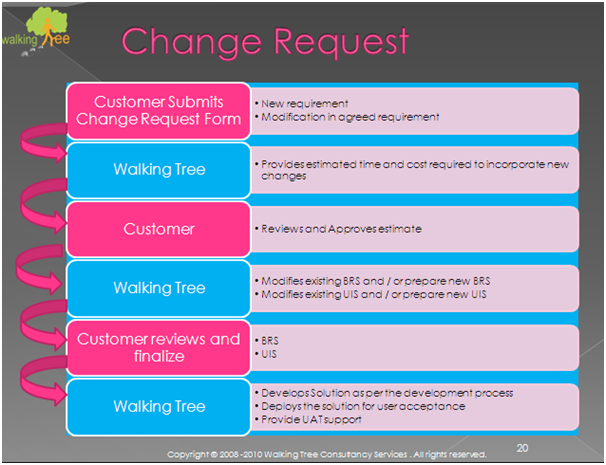About Fixed Cost Model
Projects with a fixed budget and timeline are deemed as fixed cost projects. This engagement model is ideal for small or medium sized projects wherein the requirements are fixed and changes to the scope of the project are not expected. Any change in scope must be resisted and if at all it needs to happen then it must go through the standard change request process.
Since the project is small and medium sized (the basic criteria for fixed cost) any gap in requirement understanding will cause error in estimation, timeline and quality. This will lead to dissatisfied customer and frustrated vendor. Hence, it is important to have complete understanding of requirement, document that requirement and sign off (which can be informal, depending on relationship) the requirement. Once requirement is baselined, the time and cost estimate should happen.
Approval from customer
Walking Tree does estimation based on the agreed scope (requirement, approach and design) and provided overall estimate to deliver solution tested code. The estimate also contains the effort committed by Walking Tree to support customer’s user acceptance test (UAT). If the customer needs any other support (for example pre-acceptance testing or PAT) then it needs to be explicitly mentioned. Once the Customer and Walking Tree agree with overall effort and cost, the work starts and delivery happens as per the agreed milestones.
Methodology being followed
Ideally waterfall model is more suitable for fixed cost model, where Walking Tree should be able to complete things on its own based on the finalized requirement, approach and design. However, sometimes agility is required to accommodate the modification, which are important and has no impact or least impact on the timeline.
In any model, the project is divided into three phases
1) Scope, timeline and planning
- This phase is executed as time-and-material
- Agenda of this phase is
- To gather complete requirement
- Document the requirement and design approach
- Get sign off of customer on the design approach and requirement
2) Execution
- Complete construction happens during this phase, which includes
- Coding
- Unit Testing
- Integration Testing
- On need basis, Walking Tree also performs solution testing during this phase
3) Support – Walking Tree provides
- User Acceptance Test (UAT) support for the agreed period. Any deviation needs to be discussed separately.
- Walking Tree provides any additional support needed by the customer. For example
- Support for Pre-Acceptance Test
- Performance Test
- Pre-production test
Change Request Process
Following image depicts the change request process being followed at Walking Tree:
